[PyeongChang 2018] PyeongChang draws curtains with messages of peace, progress, perseverance
By Joel LeePublished : Feb. 25, 2018 - 22:11
After more than two weeks of cutthroat competition and chivalrous camaraderie among the world’s top athletes, the PyeongChang Winter Games on South Korea’s wintry slopes and ice came to a genteel close Sunday evening.
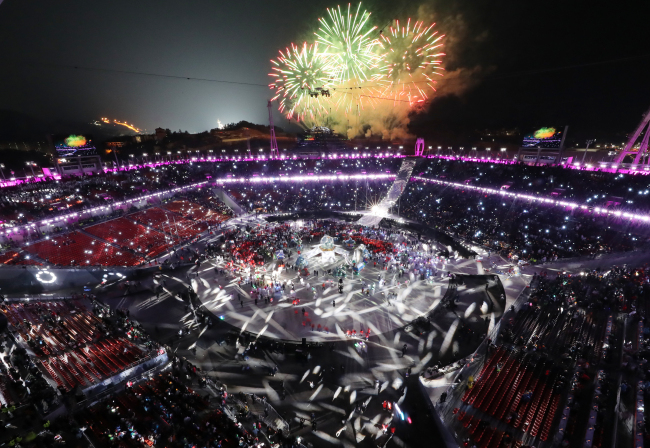
The quadrennial event from Feb. 9-25 in PyeongChang and subhost cities Gangneung and Jeongseon in Gangwon Province attracted nearly 3,000 athletes from 92 countries, making it the largest Winter Olympics in history.
The athletes competed for 102 gold medals across 15 disciplines.
South Korea, hosting its second Olympics, following the 1988 Summer Games in Seoul, entered 144 athletes across the 15 sports, capturing five gold, eight silver and four bronze medals for an overall finish of seventh place.

The top spot overall went to Norway with 14 gold, 14 silver and 11 bronze, closely trailed by Germany with 14 gold, 10 silver and seven bronze and Canada with 11 gold, eight silver and 10 bronze.
South Korea’s record at the 2018 Olympics is short of what the country had initially aimed for -- at least eight gold, four silver and eight bronze. The nation’s best results came at the 2006 Turin and 2010 Vancouver Olympics with six gold medals at each games.
The closing ceremony on Sunday night highlighted South Korea’s future and modernity as well as aspiration for peace, accentuated by state-of-the-art technologies, glittering displays of aesthetics and K-pop music featuring boy band EXO and hip-hop songstress CL.
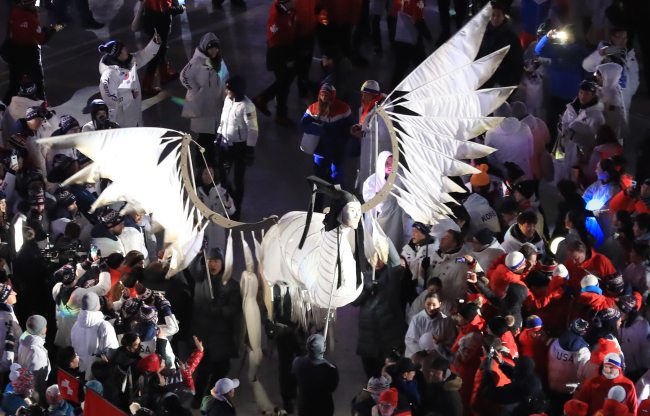
Titled “The Next Wave,” the event at the PyeongChang Olympic Stadium was packed with some 35,000 attendees, including South Korean President Moon Jae-in, the US president’s daughter Ivanka Trump and the North Korean senior party official in charge of inter-Korean affairs, Kim Yong-chol, who is accused of masterminding the North’s sinking of a South Korean warship in 2010.
An eight-minute show illuminating the 2022 Beijing Winter Games, choreographed by Chinese performance director Zhang Yimou, was also showcased.
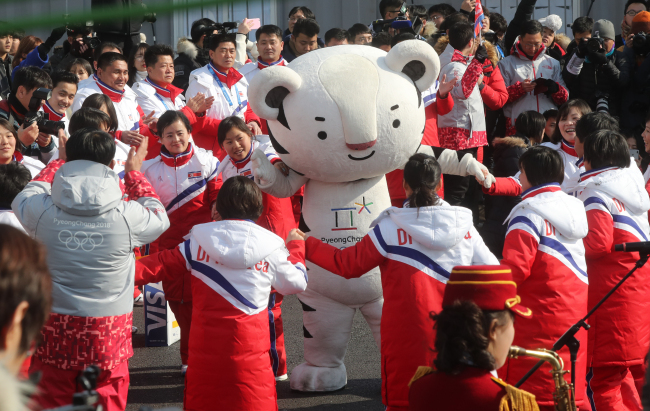
“We hope now the political world will use this momentum for a dialogue on their level because now it is up the politicians,” International Olympic Committee President Thomas Bach said Sunday. “Sport and the IOC have done what we could do.”
Bach assessed the games as successful, noting North Korean athletes participated in an Olympic event in the South for the first time. The dialogue between the IOC and North Korean officials will continue on matters of Olympics and sports, while at the same time faithfully observing international sanctions, he added.
Indeed, the PyeongChang Games were ridden with geopolitical considerations. Following a historic inter-Korean agreement reached on Jan. 17 to flesh out the terms of North Korea’s participation in the games, the communist nation sent 22 athletes alongside a delegation of top-echelon political leaders and cheerleaders.
Following through with the accord, the two Koreas’ athletes marched together under the Korean Unification Flag and in matching uniforms at the opening ceremony on Feb. 9. It marked the first such occurrence since Turin in 2006 and 10th overall at opening ceremonies of international sporting events.
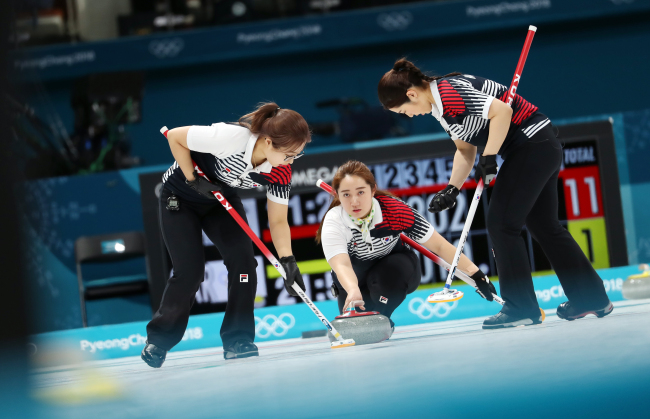
North Korea’s participation -- largely seen as a diplomatic charm offensive to earn breathing space from mounting international sanctions -- was a sudden reprieve from months and years of escalating tensions on the Korean Peninsula, perennially under the cloud of Pyongyang’s nuclear and missile threats.
The two sides -- technically still at war with each other since the 1950-1953 Korean War ended only in a cease-fire -- also formed a joint women’s hockey team, comprising 23 South Korean and 12 North Korean athletes. Despite the team losing all five matches by a combined score of 28-2, many people expressed sympathy toward its raison d’etre -- the embodiment of sorority, fair play and peace.
North Korea, dispatching its largest-ever delegation to PyeongChang, returned home empty-handed without medals. The communist nation’s track record at the Winter Olympics was poor, with one silver and one bronze in total.
North Korea’s highlight at PyeongChang centered on the figure skating pair of Ryom Tae-ok and Kim Ju-sik, who mustered up their best result with a 13th finish and a personal best of 184.98 points.

Assuaging concerns of lackluster sales, PyeongChang sold 98 percent of tickets through Saturday, buoyed by sellouts in popular competitions such as short track speedskating and figure skating. As a result, ticket revenue topped 150 billion won ($139 million).
Top medal winners at PyeongChang included Austrian alpine skier Marcel Hirscher, who won three gold in the men’s alpine combined, giant slalom and Super-G; Dutch long track speedskater Kjeld Nuis, who won two gold in the men’s 1,000 meters and 1,500 meters; and German biathlete Laura Dahl Meier, who won two gold in the women’s 10-kilometer pursuit and 7.5-kilometer sprint.
Other top performers included the Canadian figure skating pair of Tessa Virtue and Scott Moir, who won the ice dance and team event; Korean-American snowboarder Chloe Kim, who won the women’s halfpipe; and French biathlete Martin Fourcade, who won two gold in the men’s 12.5-km pursuit and 15-km mass start.
For South Korea, short track speedskating produced three gold, one silver and two bronze medals. Choi Min-jeong became the country’s sole double gold medalist with titles in the women’s 1,500 and the 3,000 relay events.
Lim Hyo-jun, the men’s 1,500 champion, was another shining star, clinching silver in the 500 as well.
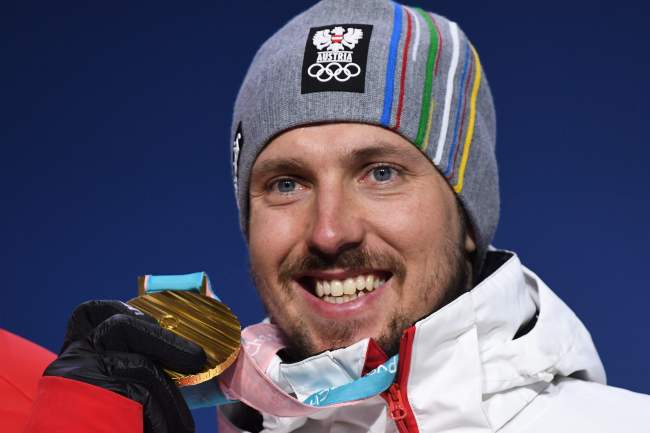
Surprising results came from skeleton slider Yun Sung-bin, who grabbed gold in the men’s skeleton on Feb. 16; alpine snowboarder Lee Sang-ho, who won silver in the men’s parallel giant slalom on Saturday; and the women’s curling team, which kept its competitive spirit alive to finish second against Sweden in the final on Sunday.
The nation’s four-man bobsled team also grabbed silver Sunday.
Long track speedskating surpassed many people’s expectations, bringing home one gold, four silver and two bronze.
Lee Seung-hoon, a five-time Olympic medalist, grabbed gold in the inaugural men’s mass start and silver in team pursuit here, establishing himself as Asia’s all-time leader in speedskating medals. Lee Sang-hwa -- who had won two straight gold medals in the women’s 500 before PyeongChang -- earned a valuable silver in the event here, possibly her last.
Cha Min-kyu’s silver in the men’s 500, Kim Tae-yun’s bronze in the men’s 1,000, Kim Min-seok’s bronze in the men’s 1,500 and Kim Bo-reum’s silver in the inaugural women’s mass start, all from the long track, were prized wins for a country traditionally dominant in short track speedskating.
PyeongChang was not without its glitches.
Reeling from the 2014 Sochi Games marred by host country Russia’s state-sponsored doping, a number of athletes failed to pass doping tests, including Japanese short track speedskater Kei Saito, Slovenian hockey player Ziga Jeglic, Russian curling athlete Aleksandr Krushelnitckii and Russian bobsled’s Nadezhda Sergeeva.
By Joel Lee (joel@heraldcorp.com)


















![[Today’s K-pop] Treasure to publish magazine for debut anniversary](http://res.heraldm.com/phpwas/restmb_idxmake.php?idx=642&simg=/content/image/2024/07/26/20240726050551_0.jpg&u=)